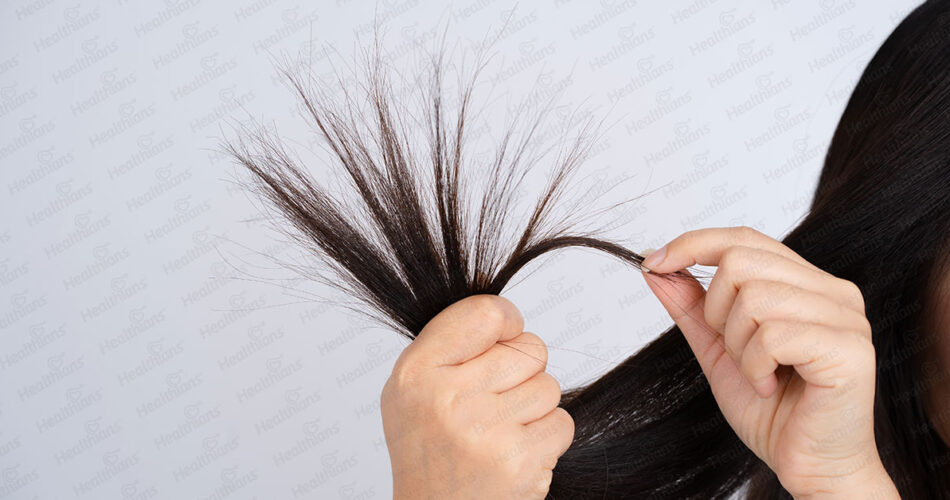Many of us have dealt with the pesky problem of split ends at some point in our lives. Split ends occur when the protective outer layer of the hair shaft gets damaged or frayed, resulting in the splitting of the hair strand. While split ends are a common hair concern, there is often confusion about their impact on hair growth.
In this blog post, we will explore the relationship between split ends and hair growth to help you understand whether split ends truly limit hair growth or if it’s just a common myth.
Understanding factors causing split ends
Before we dive into the relationship between split ends and hair growth, let’s briefly understand what causes broken and misaligned fibres at the ends of your hair lengths. Split ends can occur due to various factors, including:
a) Heat Styling:
Excessive use of heat-styling tools like flat irons, curling irons, and blow dryers can strip all the natural moisture from the hair, leading to dryness and breakage, which can result in split ends.
b) Chemical Treatments:
Chemical processes such as coloring, perming, and relaxing can remove the protective hydrophilic lipid layer thereby weakening the hair’s structure, making it more prone to split ends.
c) Mechanical Damage:
Vigorous brushing of wet hair, or roughly drying it up with a towel or forgetting to detangle the hair, can cause abrading of the cuticle structure, leading to split ends. Using hair accessories like elastic bands with metal parts and metal clips that pull or snag the hair can also contribute to split ends.
d) Environmental Factors:
Exposure to environmental stressors like harsh sunlight, pollution, and extreme weather conditions can damage the hair cuticle, leading to split ends.
e) Lack of Moisture and Nutrition:
Insufficient hydration and a lack or deficiency of certain minerals and nutrients in the diet can result in dry, brittle hair that is more prone to splitting.
f) Over-washing and Over-brushing:
Washing the hair too frequently and aggressive brushing are two factors that leave your locks more susceptible to split ends. Hair tends to get dry when it’s washed too often and strands start to become brittle and break off, leading to noticeable split ends.
The impact of split ends on hair growth
Contrary to popular belief, split ends themselves do not directly inhibit hair growth. Hair growth occurs from the hair follicles located in the scalp, not the tips of your hair – which is usually where split ends are found.
However, the presence of split ends can indirectly affect hair health by making your hair strands weaker, fragile, causing breakage much faster than the scalp can produce new hair. This breakage can lead to shorter hair lengths and hinder your hair growth progress.
Additionally, if left untreated, split ends can travel all the way up the hair shaft. This, in turn, could damage your entire hair strand and cause hair to split up the hair shaft.
Prevention and treatment of split ends
To maintain healthy hair and promote optimal hair growth, it is essential to prevent and treat split ends effectively. Here are some tips to consider:
- Trim your hair every 6 weeks to remove split ends and prevent them from traveling up the hair shaft.
- Minimize the use of heat styling tools such as blow-dryers and flat irons, and consider turning down the temp of your hot tool to protect your hair from the heat.
- Avoid or limit harsh chemical treatments like bleaching and coloring.
- Instead of metallic hair accessories, use scrunchies which are soft on the hair.
- Be gentle when brushing or detangling your hair, and use a wide-toothed comb or a brush specifically designed for detangling to keep knots at bay while avoiding split ends.
- Moisturize your hair regularly with deep conditioning treatments or natural oils to keep it hydrated and less prone to damage.
- Cover your head when going out in the sun as prolonged exposure to the UV rays can damage the outside cover of the hair strand, called the cuticle.
Closing thoughts
While split ends themselves do not directly limit hair growth, they can impact the overall health and length of your hair. Split ends make your hair dull, dry, tangled, and lifeless. When left unaddressed, they can cause hair strands to break and split prematurely, leading to a perception of limited hair growth.
To maintain healthy hair and promote optimal growth, it is important to prevent and address split ends through proper hair care practices, regular trims, and minimizing damaging styling techniques. By taking good care of your hair, you can reduce split ends and enjoy longer, healthier locks.
Disclaimer: The information provided in this blog post is for educational purposes only and should not be considered as professional advice. If you have specific concerns about your hair or any hair-related issues, it is recommended to consult a qualified hairstylist or a healthcare professional.




